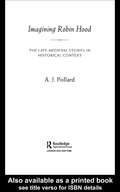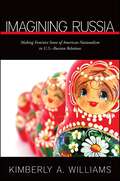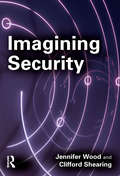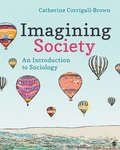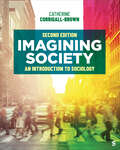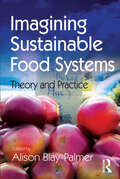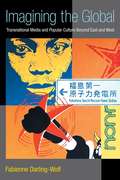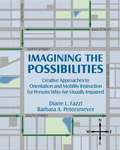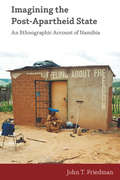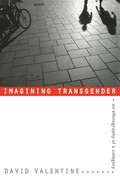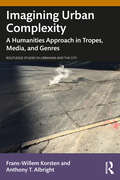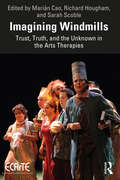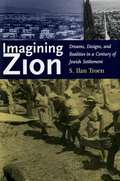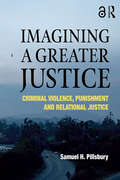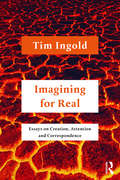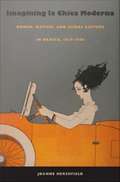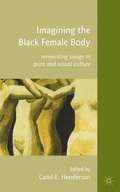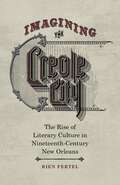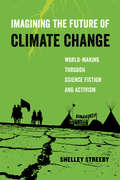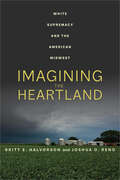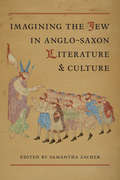- Table View
- List View
Imagining Robin Hood: The Late Medieval Stories in Historical Context
by A.J. PollardA.J. Pollard takes us back to the earliest surviving stories, tales and ballads of Robin Hood, and re-examines the story of this fascinating figure. Setting out the economic, social and political context of the time, Pollard illuminates the legend of this yeoman hero and champion of justice as never before. Imagining Robin Hood questions: what a ‘yeoman’ was, and what it meant to be a fifteenth-century Englishman Was Robin Hood hunted as an outlaw, or respected as an officially appointed forest ranger? Why do we ignore the fact that this celebrated hero led a life of crime? Did he actually steal from the rich and give to the poor? Answering these questions, the book looks at how Robin Hood was ‘all things to all men’ since he first appeared; speaking to the gentry, the peasants and all those in between. The story of the freedom-loving outlaw tells us much about the English nation, but tracing back to the first stories reveals even more about the society in which the legend arose. An enthralling read for all historians and general readers of this fascinating subject.
Imagining Russia: Making Feminist Sense of American Nationalism in U.S.–Russian Relations
by Kimberly A. WilliamsCo-winner of the 2009 SUNY Press Dissertation/First Book Prize in Women's and Gender Studies, Imagining Russia uses U.S.–Russian relations between the fall of the Soviet Union in 1991 and the U.S.-led invasion of Iraq in 2003 as a case study to examine the deployment of gendered, racialized, and heteronormative visual and narrative depictions of Russia and Russians in contemporary narratives of American nationalism and U.S. foreign policy. Through analyses of several key post-Soviet American popular and political texts, including the hit television series The West Wing, Washington D.C.'s International Spy Museum, and the legislative hearings of the Freedom Support Act and the Trafficking Victims Protection Act, Williams calls attention to the production and operation of five types of "gendered Russian imaginaries" that were explicitly used to bolster support for and legitimize U.S. geopolitical unilateralism after the dissolution of the Soviet Union, demonstrating the ways that the masculinization of U.S. military, political, and financial power after 1991 paved the way for the invasion of Iraq in 2003.
Imagining Seattle: Social Values in Urban Governance (Our Sustainable Future)
by Serin D. HoustonImagining Seattle dives into some of the most pressing and compelling aspects of contemporary urban governance in the United States. Serin D. Houston uses a case study of Seattle to shed light on how ideas about environmentalism, privilege, oppression, and economic growth have become entwined in contemporary discourse and practice in American cities. Seattle has, by all accounts, been hugely successful in cultivating amenities that attract a creative class. But policies aimed at burnishing Seattle’s liberal reputation often unfold in ways that further disadvantage communities of color and the poor, complicating the city’s claims to progressive politics. Through ethnographic methods and a geographic perspective, Houston explores a range of recent initiatives in Seattle, including the designation of a new cultural district near downtown, the push to charge for disposable shopping bags, and the advent of training about institutional racism for municipal workers. Looking not just at what these policies say but at how they work in practice, she finds that opportunities for social justice, sustainability, and creativity are all constrained by the prevalence of market-oriented thinking and the classism and racism that seep into the architecture of many programs and policies. Houston urges us to consider how values influence actions within urban governance and emphasizes the necessity of developing effective conditions for sustainability, creativity, and social justice in this era of increasing urbanization.
Imagining Security
by Jennifer Wood Clifford ShearingThis book is concerned with the ways in which the problem of security is thought about and promoted by a range of actors and agencies in the public, private and nongovernmental sectors. The authors are concerned not simply with the influence of risk-based thinking in the area of security, but seek rather to map the mentalities and practices of security found in a variety of sectors, and to understand the ways in which thinking from these sectors influence one another. Their particular concern is to understand the drivers of innovation in the governance of security, the conditions that make innovation possible and the ways in which innovation is imagined and realised by actors from a wide range of sectors. The book has two key themes: first, governance is now no longer simply shaped by thinking within the state sphere, for thinking originating within the business and community spheres now also shapes governance, and influence one another. Secondly, these developments have implications for the future of democratic values as assumptions about the traditional role of government are increasingly challenged. The first five chapters of the book explore what has happened to the governance of security, through an analysis of the drivers, conditions and processes of innovation in the context of particular empirical developments. Particular reference is made here to 'waves of change' in security within the Ontario Provincial Police in Canada. In the final chapter the authors examine the implications of 'nodal governance' for democratic values, and then suggest normative directions for deepening democracy in these new circumstances.
Imagining Society: An Introduction to Sociology
by Catherine Corrigall-BrownSubject Line: Discover your sociological imagination! Teaser: Request your free review copy today of Imagining Society today Discover your sociological imagination! Imagining Society illuminates the connections between your life and larger social structures. Imagining Society by award-wining scholar Catherine J. Corrigall-Brown is an innovative, versatile new book that uses the theories, ideas, and research in sociology to help students make sense of the world around them.
Imagining Society: An Introduction to Sociology
by Catherine Corrigall-BrownSubject Line: Discover your sociological imagination! Teaser: Request your free review copy today of Imagining Society today Discover your sociological imagination! Imagining Society illuminates the connections between your life and larger social structures. Imagining Society by award-wining scholar Catherine J. Corrigall-Brown is an innovative, versatile new book that uses the theories, ideas, and research in sociology to help students make sense of the world around them.
Imagining Society: An Introduction to Sociology
by Catherine Corrigall-BrownImagining Society, Second Edition is an introductory text that presents sociology as a distinctly human enterprise. In every chapter, as they are learning the discipline’s foundational concepts, readers are led on a journey, across time and space, to encounter some of sociology’s key "makers"—the creative individuals whose representations of the social world enable us to make sense of it and change it for the better. At each stop they will be immersed in the actions, ideas, and original thoughts of these diverse and seminal thinkers, whose empirical methods and theoretical insights have inspired other sociologists and form the building blocks of the discipline. Exercises in the text create opportunities for students to activate their own imaginations and to also see familiar contemporary culture and society—TV shows, popular music, advertising, organizations, thought-leaders and authority figures, fads and movements, etc.—through fresh eyes.
Imagining Society: An Introduction to Sociology
by Catherine Corrigall-BrownImagining Society, Second Edition is an introductory text that presents sociology as a distinctly human enterprise. In every chapter, as they are learning the discipline’s foundational concepts, readers are led on a journey, across time and space, to encounter some of sociology’s key "makers"—the creative individuals whose representations of the social world enable us to make sense of it and change it for the better. At each stop they will be immersed in the actions, ideas, and original thoughts of these diverse and seminal thinkers, whose empirical methods and theoretical insights have inspired other sociologists and form the building blocks of the discipline. Exercises in the text create opportunities for students to activate their own imaginations and to also see familiar contemporary culture and society—TV shows, popular music, advertising, organizations, thought-leaders and authority figures, fads and movements, etc.—through fresh eyes.
Imagining Sustainable Food Systems: Theory and Practice
by Alison Blay-PalmerWhat defines a sustainable food system? How can it be more inclusive? How do local and global scales interact and how does power flow within food systems? How to encourage an interdisciplinary approach to realizing sustainable food systems? And how to activate change? These questions are considered by EU and North American academics and practitioners in this book. Using a wide range of case studies, it provides a critical overview, showing how and where theory and practice can converge to produce more sustainable food systems.
Imagining The Global: Transnational Media And Popular Culture Beyond East And West
by Fabienne Darling-WolfBased on a series of case studies of globally distributed media and their reception in different parts of the world, Imagining the Global reflects on what contemporary global culture can teach us about transnational cultural dynamics in the 21st century. A focused multisited cultural analysis that reflects on the symbiotic relationship between the local, the national, and the global, it also explores how individuals' consumption of global media shapes their imagination of both faraway places and their own local lives. Chosen for their continuing influence, historical relationships, and different geopolitical positions, the case sites of France, Japan, and the United States provide opportunities to move beyond common dichotomies between East and West, or United States and "the rest. " From a theoretical point of view, Imagining the Global endeavors to answer the question of how one locale can help us understand another locale. Drawing from a wealth of primary sources--several years of fieldwork; extensive participant observation; more than 80 formal interviews with some 160 media consumers (and occasionally producers) in France, Japan, and the United States; and analyses of media in different languages--author Fabienne Darling-Wolf considers how global culture intersects with other significant identity factors, including gender, race, class, and geography. Imagining the Global investigates who gets to participate in and who gets excluded from global media representation, as well as how and why the distinction matters.
Imagining The Possibilities
by Diane L. Fazzi Barbara PetersmeyerThis book explores creative methods of teaching various orientation and mobility techniques to persons who are blind or visually impaired, including those with multiple disabilities. Imagining the Possibilities is a hands-on teaching resource for pre-service and practicing O&M specialists. It offers materials, samples, and creative teaching strategies for working effectively with students.
Imagining The Post-apartheid State: An Ethnographic Account of Namibia
by John T. FriedmanIn northwest Namibia, people's political imagination offers a powerful insight into the post-apartheid state. Based on extensive anthropological fieldwork, this book focuses on the former South African apartheid regime and the present democratic government; it compares the perceptions and practices of state and customary forms of judicial administration, reflects upon the historical trajectory of a chieftaincy dispute in relation to the rooting of state power and examines everyday forms of belonging in the independent Namibian State. By elucidating the State through a focus on the social, historical and cultural processes that help constitute it, this study helps chart new territory for anthropology, and it contributes an ethnographic perspective to a wider set of interdisciplinary debates on the State and state processes.
Imagining Transgender: An Ethnography of a Category
by David ValentineImagining Transgender is an ethnography of the emergence and institutionalization of transgender as a category of collective identity and political activism. Embraced by activists in the early 1990s to advocate for gender-variant people, the category quickly gained momentum in public health, social service, scholarly, and legislative contexts. Working as a safer-sex activist in Manhattan during the late 1990s, David Valentine conducted ethnographic research among mostly male-to-female transgender-identified people at drag balls, support groups, cross-dresser organizations, clinics, bars, and clubs. However, he found that many of those labeled "transgender" by activists did not know the term or resisted its use. Instead, they self-identified as "gay," a category of sexual rather than gendered identity and one rejected in turn by the activists who claimed these subjects as transgender. Valentine analyzes the reasons for and potential consequences of this difference, and how social theory is implicated in it. Valentine argues that "transgender" has been adopted so rapidly in the contemporary United States because it clarifies a model of gender and sexuality that has been gaining traction within feminism, psychiatry, and mainstream gay and lesbian politics since the 1970s: a paradigm in which gender and sexuality are distinct arenas of human experience. This distinction and the identity categories based on it erase the experiences of some gender-variant people--particularly poor persons of color--who conceive of gender and sexuality in other terms. While recognizing the important advances transgender has facilitated, Valentine argues that a broad vision of social justice must include, simultaneously, an attentiveness to the politics of language and a recognition of how social theoretical models and broader political economies are embedded in the day-to-day politics of identity.
Imagining Urban Complexity: A Humanities Approach in Tropes, Media, and Genres (Routledge Studies in Urbanism and the City)
by Frans-Willem Korsten Anthony T. AlbrightImagining Urban Complexity introduces passionate and critical perspectives on the link between the humanities and urban studies. It emphasizes tropes, media, and genres as cultural techniques that shape complexity in urban environments by distributing affordances, modes of sensing, and modes of sense-making.Focusing on urban political and cultural dynamics in 24 global cities, the book shows that urban environments are thematized in literature and art, but are also entities that are shaped, perceived, interpreted, and experienced through sense-making techniques that have long been central concerns of the humanities. These techniques, the book argues, activate a dialectic between urban imaginations and cancellations. Tropes, media, and genres are aesthetically and politically powerful: they propel imaginations and open up multiplicities of urban possibilities, they naturalize actualized orders, and they cancel alternatives. The book moves between close readings of city spaces and more systemic and infrastructural approaches to urban environments, providing tools and strategies that can be adapted and extended to understand urban complexity in different cultural and political contexts.The book speaks to global audiences from a continental philosophical tradition. It is relevant to undergraduates, postgraduates, and academic researchers in the fields of critical urban studies, urban design, comparative literature, cultural studies, cultural analysis, ecocriticism, political theory, and ethics.
Imagining Windmills: Trust, Truth, and the Unknown in the Arts Therapies
by Richard Hougham Sarah Scoble Marián CaoImagining Windmills presents a compilation of scholarly chapters by selected authors of global standing in the arts therapies. This book reflects the theme of the 15th International Conference of the European Consortium for Arts Therapies (ECArTE), held in Alcalá de Henares, Spain, birthplace of Miguel de Cervantes. This innovative work seeks to further understanding of arts therapy education, practice and research and incorporates current thinking from art therapists, dance-movement therapists, dramatherapists and music therapists. Writers from Belgium, Germany, Greece, India, Israel, Italy, The Netherlands, Spain, Sweden, UK and USA combine to give an international voice to the book, which celebrates cultural distinctiveness, while also presenting shared intercultural developments in the professions. This interdisciplinary publication explores questions of the unknown and the imagined, misconception, delusion, truth and trust in the arts therapies. It enquires into ways in which education and the practice of the arts therapies engage with the imagination as a place of multiple realities, which may lead us closer to finding our truth. This book will be of interest and relevance not only to those in the arts therapeutic community, but also to a broad audience including those in related professions – for instance psychology, sociology, the arts, medicine, health and wellbeing and education.
Imagining Zion: Dreams, Designs, and Realities in a Century of Jewish Settlement
by S. Ilan TroenThis timely book tells the fascinating story of how Zionists colonizers planned and established nearly 700 agricultural settlements, towns, and cities from the 1880s to the present. This extraordinary activity of planners, architects, social scientists, military personnel, politicians, and settlers is inextricably linked to multiple contexts: Jewish and Zionist history, the Arab/Jewish conflict, and the diffusion of European ideas to non-European worlds. S. Ilan Troen demonstrates how professionals and settlers continually innovated plans for both rural and urban frontiers in response to the competing demands of social and political ideologies and the need to achieve productivity, economic independence, and security in a hostile environment. In the 1930s, security became the primary challenge, shaping and even distorting patterns of growth. Not until the 1993 Oslo Accords, with prospects of compromise and accommodation, did planners again imagine Israel as a normal state, developing like other modern societies. Troen concludes that if Palestinian Arabs become reconciled to a Jewish state, Israel will reassign priority to the social and economic development of the country and region.
Imagining a Greater Justice: Criminal Violence, Punishment and Relational Justice
by Samuel H. PillsburyEven for violent crime, justice should mean more than punishment. By paying close attention to the relational harms suffered by victims, this book develops a concept of relational justice for survivors, offenders and community. Relational justice looks beyond traditional rules of legal responsibility to include the social and emotional dimensions of human experience, opening the way for a more compassionate, effective and just response to crime. The book’s chapters follow a journey from victim experiences of violence to community healing from violence. Early chapters examine the relational harms inflicted by the worst wrongs, the moral responsibility of wrongdoers and common mistakes made in judging wrongdoing. Particular attention is paid here to sexual violence. The book then moves to questions of just punishment: proper sentencing by judges, mandatory sentences approved by the public, and the realities of contemporary incarceration, focusing particularly on solitary confinement and sexual violence. In its remaining chapters, the book looks at changes brought by the victims' rights movement and victim needs that current law does not, and perhaps cannot meet. It then addresses possibilities for offender change and challenges for majority America in addressing race discrimination in criminal justice. The book concludes with a look at how individuals might live out the ideals of a greater—relational—justice.
Imagining for Real: Essays on Creation, Attention and Correspondence
by Tim IngoldWhat does imagination do for our perception of the world? Why should reality be broken off from our imagining of it? It was not always thus, and in these essays, Tim Ingold sets out to heal the break between reality and imagination at the heart of modern thought and science. Imagining for Real joins with a lifeworld ever in creation, attending to its formative processes, corresponding with the lives of its human and nonhuman inhabitants. Building on his two previous essay collections, The Perception of the Environment and Being Alive , this book rounds off the extraordinary intellectual project of one of the world’s most renowned anthropologists. Offering hope in troubled times, these essays speak to coming generations in a language that surpasses disciplinary divisions. They will be essential reading not only for anthropologists but also for students in fi elds ranging from art, aesthetics, architecture and archaeology to philosophy, psychology, human geography, comparative literature and theology.
Imagining la Chica Moderna: Women, Nation, and Visual Culture in Mexico, 1917-1936
by Joanne HershfieldIn the years following the Mexican Revolution, visual images of la chica moderna, the modern woman, au courant in appearance and attitude, popped up in mass media across the country. Some of the images were addressed directly to women through advertisements, as illustrations accompanying articles in women's magazines, and on the "women's pages" in daily newspapers. Others illustrated domestic and international news stories, promoted tourism, or publicized the latest Mexican and Hollywood films. In Imagining la Chica Moderna, Joanne Hershfield examines these images, exploring how the modern woman was envisioned in Mexican popular culture and how she figured into postrevolutionary contestations over Mexican national identity. Through her detailed interpretations of visual representations of la chica moderna, Hershfield demonstrates how the images embodied popular ideas and anxieties about sexuality, work, motherhood, and feminine beauty, as well as class and ethnicity. Her analysis takes into account the influence of mexicanidad, the vision of Mexican national identity promoted by successive postrevolutionary administrations, and the fashions that arrived in Mexico from abroad, particularly from Paris, New York, and Hollywood. She considers how ideals of the modern housewife were promoted to Mexican women through visual culture; how working women were represented in illustrated periodicals and in the Mexican cinema; and how images of traditional "types" of Mexican women, such as la china poblana (the rural woman), came to define a "domestic exotic" form of modern femininity. Scrutinizing photographs of Mexican women that accompanied articles in the Mexican press during the 1920s and 1930s, Hershfield reflects on the ways that the real and the imagined came together in the production of la chica moderna.
Imagining the Black Female Body
by Carol E. HendersonThis volume explores issues of black female identity through the various "imaginings" of the black female body in print and visual culture. Contributions emphasize the ways in which the black female body is framed and how black women (and their allies) have sought to write themselves back into social discourses on their terms.
Imagining the Byzantine Past
by Elena N. BoeckTwo lavish, illustrated histories confronted and contested the Byzantine model of empire. The Madrid Skylitzes was created at the court of Roger II of Sicily in the mid-twelfth century. The Vatican Manasses was produced for Ivan Alexander of Bulgaria in the mid-fourteenth century. Through close analysis of how each chronicle was methodically manipulated, this study argues that Byzantine history was selectively re-imagined to suit the interests of outsiders. The Madrid Skylitzes foregrounds regicides, rebellions, and palace intrigue in order to subvert the divinely ordained image of order that Byzantine rulers preferred to project. The Vatican Manasses presents Byzantium as a platform for the accession of Ivan Alexander to the throne of the Third Rome, the last and final world-empire. Imagining the Byzantine Past demonstrates how distinct visions of empire generated diverging versions of Byzantium's past in the aftermath of the Crusades.
Imagining the Creole City: The Rise of Literary Culture in Nineteenth-Century New Orleans
by Rien FertelIn the early years of the nineteenth century, the burgeoning cultural pride of white Creoles in New Orleans intersected with America's golden age of print, to explosive effect. Imagining the Creole City reveals the profusion of literary output -- histories and novels, poetry and plays -- that white Creoles used to imagine themselves as a unified community of writers and readers.Rien Fertel argues that Charles Gayarré's English-language histories of Louisiana, which emphasized the state's dual connection to America and to France, provided the foundation of a white Creole print culture predicated on Louisiana's exceptionalism. The writings of authors like Grace King, Adrien Rouquette, and Alfred Mercier consciously fostered an image of Louisiana as a particular social space, and of themselves as the true inheritors of its history and culture. In turn, the forging of this white Creole identity created a close-knit community of cosmopolitan Creole elites, who reviewed each other's books, attended the same salons, crusaded against the popular fiction of George Washington Cable, and worked together to preserve the French language in local and state governmental institutions. Together they reimagined the definition of "Creole" and used it as a marker of status and power.By the end of this group's era of cultural prominence, Creole exceptionalism had become a cornerstone in the myth of Louisiana in general and of New Orleans in particular. In defining themselves, the authors in the white Creole print community also fashioned a literary identity that resonates even today.
Imagining the Future of Climate Change: World-Making through Science Fiction and Activism
by Shelley StreebyThis title is part of American Studies Now and available as an e-book first. Visit ucpress.edu/go/americanstudiesnow to learn more. From the 1960s to the present, activists, artists, and science fiction writers have imagined the consequences of climate change and its impacts on our future. Authors such as Octavia Butler and Leslie Marmon Silko, movie directors such as Bong Joon-Ho, and creators of digital media such as the makers of the Maori web series Anamata Future News have all envisioned future worlds in the wake of imminent environmental collapse, engaging audiences to think about the Earth’s sustainability. As public awareness of climate change has grown, so has the popularity of imaginative works of climate fiction that connect science with activism. Today real world social movements helmed by Indigenous people and people of color are leading the way against the greatest threat to our environment: the fossil fuel industry. It is through these stories and movements by Natives and people of color—both in the real world and imagined through science fiction—that we understand the relationship between culture and activism and how both can be a valuable tool in creating our future. Imagining the Future of Climate Change introduces readers to the history and most significant flashpoints in climate justice through speculative fictions and social movements to explore post-disaster possibilities and the art of world-making.
Imagining the Heartland: White Supremacy and the American Midwest
by Britt E. HalvorsonAn overdue examination of the Midwest's long influence on nationalism and white supremacy. Though many associate racism with the regional legacy of the South, it is the Midwest that has upheld some of the nation’s most deep-seated convictions about the value of whiteness. From Jefferson’s noble farmer to The Wizard of Oz, imagining the Midwest has quietly gone hand-in-hand with imagining whiteness as desirable and virtuous. Since at least the U.S. Civil War, the imagined Midwest has served as a screen or canvas, projecting and absorbing tropes and values of virtuous whiteness and its opposite, white deplorability, with national and global significance. Imagining the Heartland provides a poignant and timely answer to how and why the Midwest has played this role in the American imagination. In Imagining the Heartland, anthropologists Britt Halvorson and Josh Reno argue that there is an unexamined affinity between whiteness, Midwestness, and Americanness, anchored in their shared ordinary and homogenized qualities. These seemingly unremarkable qualities of the Midwest take work; they do not happen by default. Instead, creating successful representations of ordinary Midwestness, in both positive and negative senses, has required cultural expression through media ranging from Henry Ford’s assembly line to Grant Wood’s famous "American Gothic." Far from being just another region among others, the Midwest is a political and affective logic in racial projects of global white supremacy. Neglecting the Midwest means neglecting the production of white supremacist imaginings at their most banal and at their most influential, their most locally situated and their most globally dispersed.
Imagining the Jew in Anglo-Saxon Literature and Culture
by Samantha ZacherMost studies of Jews in medieval England begin with the year 1066, when Jews first arrived on English soil. Yet the absence of Jews in England before the conquest did not prevent early English authors from writing obsessively about them. Using material from the writings of the Church Fathers, contemporary continental sources, widespread cultural stereotypes, and their own imaginations, their depictions of Jews reflected their own politico-theological experiences.The thirteen essays in Imagining the Jew in Anglo-Saxon Literature and Culture examine visual and textual representations of Jews, the translation and interpretation of Scripture, the use of Hebrew words and etymologies, and the treatment of Jewish spaces and landmarks. By studying the "imaginary Jews" of Anglo-Saxon England, they offer new perspectives on the treatment of race, religion, and ethnicity in pre- and post-conquest literature and culture.
